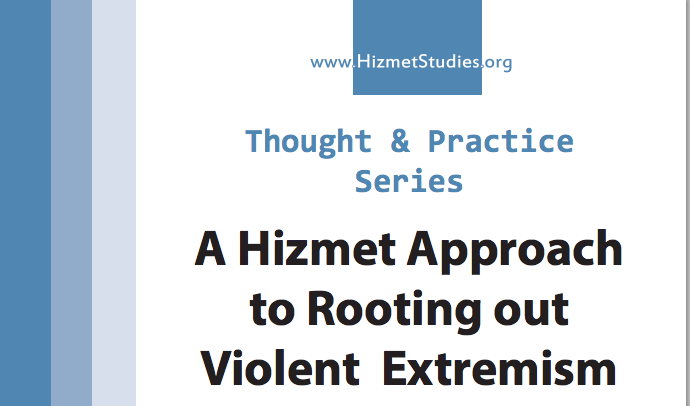The Centre for Hizmet Studies is delighted to launch its latest report titled ‘A Hizmet Approach to Rooting out Violent Extremism’ by Ozcan Keles and Ismail Mesut Sezgin. This is the second publication in the ‘thought and practice’ series, the first being ‘Gulen on Dialogue’. The series aims both to contribute to a more nuanced understanding of Hizmet’s thought ad praxis on significant contemporary issues such as tackling violent extremism, the Kurdish issue or political Islam.
This report targets researchers, policy makers and media interested in devising policies and strategies to prevent violent extremism. Please see below for the reports ‘Executive Summary’. The report can be downloaded in full for free from the link below.
Executive Summary
- Hizmet is an Islamically-inspired grassroots civil society movement with a presence in over 160 countries and whose core teachings, practice and refutations of violent extremism originate from its robust interpretation of the Qur’an and Sunna. Therefore, the question of what Hizmet thinks about, and how it responds to, violent extremism is most relevant to those concerned with this issue.
- Part one of this publication explores Hizmet’s theological refutations of violent extremism which claim an Islamic justification. Part two explores Hizmet’s core teachings, which underpin its values and practice and act as a positive counter-narrative undermining violent extremist ideology in the process. Part three covers the channels and conveyors through which Hizmet popularises that counter-narrative among the wider Muslim public. The conclusion draws these three parts together demonstrating how they undermine violent extremist ideology and tackle some of its root causes. Finally, the publication concludes with some recommendations for Hizmet and other stakeholders.
- Hizmet does not attempt to defeat violent extremist ideology or practice by meeting it head on. Rather, the core Islamic teachings that underpin its values and activism negate violent extremist ideology, mindset and practice as a natural by-product and default outcome of its positive work. Those core teachings are popularised among the wider public through a series of channels and practices acting as conveyors. Hizmet’s core teachings and the values and activism they underpin are diametrically opposed to and mutually exclusive with those associated with violent extremism; therefore, the stronger one grows, the weaker the other becomes. Accordingly, the goal of defeating extremism is made to ensue without being directly and aggressively pursued, ensuring it avoids the pitfalls associated with being reactive – hence the term deradicalisation by default.
- The views of the Islamic scholar Fethullah Gülen on violent extremism and terrorism are not conjunctural but authentic and fundamental. His condemnation of such acts has been unequivocal, consistent and also proactive as he and Hizmet collectively develop and disseminate a positive counter-narrative undermining violent extremist ideology and worldview. The publication looks at Gülen’s foundational views for rejecting violent extremism as well exploring his views on the more controversial and specific debates and issues on the topic, including groups declaring war, the legitimacy of targeting innocent civilians, suicide attacks, Islamic state, and the dichotomous worldview of dar al-harb and dar al-Islam.
- The report concludes by offering three recommendations to Hizmet and other stakeholders on how best to optimise Hizmet’s approach to rooting out violent extremism, noting that it is not only the content of the argument that is made but also the emotional packaging and grooming with which it is presented that is convincing to new recruits and that Hizmet’s theology and practice has the advantage of addressing both facets together.
To download the report in full please click here.

